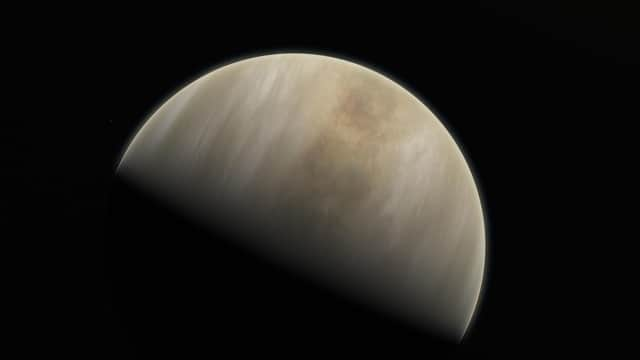‘Potential for life’ on the planet Venus claim scientists


The discovery of phosphine gas in the clouds of Venus could possibly indicate signs of life on the planet, scientists have said.
The gas has been detected in the atmosphere of Venus, suggesting the planet could host unknown photochemical or geochemical processes.
Advertisement
Hide AdAdvertisement
Hide AdOn Earth, phosphine - a colourless gas that has the smell of garlic or decaying fish - is produced predominantly by anaerobic biological sources.
Small amounts of the gas occur naturally from the breakdown of organic matter.
While the conditions on the surface of Venus are hostile to life, the environment of its upper cloud deck, around 53-62km (33-38 miles) above the surface, is temperate.
But according to the study, published in Nature Astronomy, the make-up of the clouds is highly acidic, and in such conditions phosphine would be destroyed very quickly.
Jane Greaves, from Cardiff University, and colleagues observed Venus with the James Clerk Maxwell Telescope and the Atacama Large Millimeter/submillimeter Array in 2017 and 2019, respectively.
They detected a spectral signature that is unique to phosphine, and estimated an abundance of 20 parts-per-billion of phosphine in Venus's clouds.
Prof Greaves said: "We have detected a rare gas called phosphine in the atmosphere of our neighbour planet Venus, and the reason for our excitement is that phosphine gas on Earth is made by microorganisms that live in oxygen free environments.
"And so there is a chance that we have detected some kind of living organisms in the clouds of Venus."
Advertisement
Hide AdAdvertisement
Hide AdResearchers looked at different ways the gas may have been produced, including from sources on the surface of the planet and they were unable to determine the source of the trace quantities of phosphine.
However, they argue that the detection of phosphine is not robust evidence for microbial life and only indicates potentially unknown geological or chemical processes occurring on the planet.
They say further observations and modelling are needed to explore the origin of the gas in the planet's atmosphere.
Writing in the paper, they say: "PH3 (phosphine) could originate from unknown photochemistry or geochemistry, or, by analogy with biological production of PH3 on Earth, from the presence of life."
They add: "If no known chemical process can explain PH3 within the upper atmosphere of Venus, then it must be produced by a process not previously considered plausible for Venusian conditions.
"This could be unknown photochemistry or geochemistry, or possibly life."
The researchers continue: "Even if confirmed, we emphasise that the detection of PH3 is not robust evidence for life, only for anomalous and unexplained chemistry.
"There are substantial conceptual problems for the idea of life in Venus's clouds - the environment is extremely dehydrating as well as hyperacidic.
Advertisement
Hide AdAdvertisement
Hide Ad"However, we have ruled out many chemical routes to PH3, with the most likely ones falling short by four to eight orders of magnitude.
"To further discriminate between unknown photochemical and/or geological processes as the source of Venusian PH3, substantial modelling and experimentation will be important.
"Ultimately, a solution could come from revisiting Venus for in situ measurements or aerosol return."
Dr Bains said: "We're not claiming there's life. We're claiming there's something, that is really unknown, and it might be life."
Reporting by PA
A message from the Editor:
Thank you for reading this story on our website. While I have your attention, I also have an important request to make of you.
With the coronavirus lockdown having a major impact on many of our advertisers - and consequently the revenue we receive - we are more reliant than ever on you taking out a digital subscription.
Subscribe to scotsman.com and enjoy unlimited access to Scottish news and information online and on our app. With a digital subscription, you can read more than 5 articles, see fewer ads, enjoy faster load times, and get access to exclusive newsletters and content. Visit https://www.scotsman.com/subscriptions now to sign up.
Our journalism costs money and we rely on advertising, print and digital revenues to help to support them. By supporting us, we are able to support you in providing trusted, fact-checked content for this website.
Comments
Want to join the conversation? Please or to comment on this article.